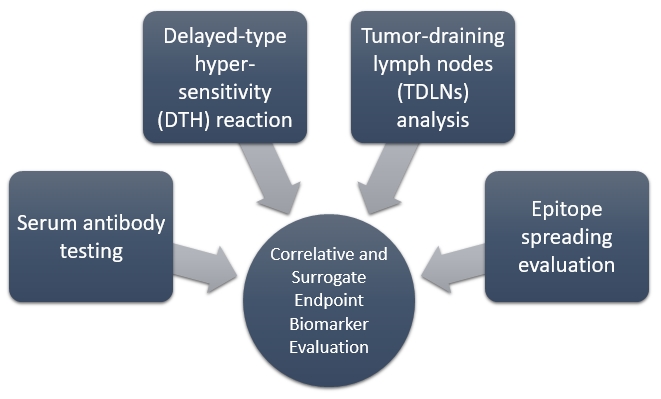All products and services are For Research Use Only and CANNOT be used in the treatment or diagnosis of disease.
The identification of correlative and surrogate immune endpoint biomarker for clinical endpoints is an area of ongoing research in clinical trial immune monitoring. Creative Biolabs has organized a staff of outstanding scientists who have engaged in correlative and surrogate endpoint biomarker research for many years. Our scientific team has the necessary expertise and capabilities to provide overall solutions for endpoint biomarker development, focusing on innovative research. Our comprehensive portfolio fully supports our clients' endpoint biomarker development.
When a randomized trial requires a long time to obtain a clinically meaningful endpoint, researchers are often interested in evaluating treatment effects sooner using a surrogate endpoint biomarker. A surrogate endpoint biomarker is a biomarker observed after randomization and before the true endpoint that is used to conclude the effect of treatment on the true endpoint. The use of a surrogate endpoint biomarker is fundamentally an exercise in extrapolation, with the strong possibility of obtaining misleading results. Therefore, before its use to shorten a randomized trial, a surrogate endpoint must satisfy stringent criteria. There are five criteria for the evaluation of surrogate endpoints from historical trials, including 1) An acceptable sample size multiplier, 2) A prediction separation score larger than 1, 3) Similarity of the biological mechanism of treatments in the new trial and the historical trials, 4) Similarity of secondary treatments following the observation of the surrogate endpoint, 5) A low risk of harmful side effects after observation of the surrogate endpoint.

Based on our advanced Immune Monitoring Platform, Creative Biolabs is versed in correlative and surrogate endpoint biomarker evaluation. Several strategies have been developed for endpoint biomarker development and validation, including serum antibody testing, delayed-type hyper-sensitivity (DTH) reaction, tumor-draining lymph nodes (TDLNs) analysis, and epitope spreading evaluation. Our scientists are very glad to lend their expertise and assist our clients to overcome any hurdles that they may face during correlative and surrogate endpoint biomarker development.
Serum antibody testing, also known as serology testing, looks for the presence of antibodies, which are target proteins made in response to infections.
Allowing for the evaluation of an immunotherapy ability to generate T cell memory responses following immunotherapy, DTH is predictive of clinical outcome. This technology has been used as a measure of antigen recall or memory and has been shown to directly correlate with peripheral blood antigen-specific T cell responses.
Studies have shown that significant changes in immune-cell populations arise within TDLNs, and such changes strongly correlate with clinical outcomes. Therefore, TDLN is recognized as an early site of interaction between cancer cells and the immune system.
Epitope spreading means that anticancer therapy induces tumor cell lysis that in turn releases tumor-associated antigens, inducing additional antitumor immunity. Several clinical trials have demonstrated a correlation between patients who develop epitope spreading and improved clinical response to immune therapies. Epitope spreading evaluation can be performed through IFN-γ ELISPOT analysis of T cell responses to selected tumor antigen peptide mixes not targeted by the immunotherapy.
Our R&D scientific team has designed and finished many correlative and surrogate endpoint biomarker development and validation studies during the past few years. By applying our scientists' experience and a proven quality system, Creative Biolabs continues to serve our clients with professionalism and expertise in correlative and surrogate endpoint biomarker development. For more detailed information, please feel free to contact us or directly send us an inquiry.
Reference
For any technical issues or product/service related questions, please leave your information below. Our team will contact you soon.
 NEWSLETTER
NEWSLETTER
The latest newsletter to introduce the latest breaking information, our site updates, field and other scientific news, important events, and insights from industry leaders
LEARN MORE NEWSLETTER NEW SOLUTION
NEW SOLUTION
CellRapeutics™ In Vivo Cell Engineering: One-stop in vivo T/B/NK cell and macrophage engineering services covering vectors construction to function verification.
LEARN MORE SOLUTION NOVEL TECHNOLOGY
NOVEL TECHNOLOGY
Silence™ CAR-T Cell: A novel platform to enhance CAR-T cell immunotherapy by combining RNAi technology to suppress genes that may impede CAR functionality.
LEARN MORE NOVEL TECHNOLOGY NEW SOLUTION
NEW SOLUTION
Canine CAR-T Therapy Development: From early target discovery, CAR design and construction, cell culture, and transfection, to in vitro and in vivo function validation.
LEARN MORE SOLUTION